|
|
|
Sort Order |
|
|
|
Items / Page
|
|
|
|
|
|
|
| Srl | Item |
| 1 |
ID:
125384
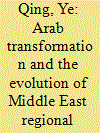

|
|
|
|
|
| Publication |
2013.
|
| Summary/Abstract |
Since its outbreak in the beginning of 2011, the Arab transformation that swept almost the whole middle east has now entered the third year with its geopolitical implications beginning to unfold gradually. When erupted in Tunisia and Egypt, it was driven primarily by internal dynamics and was regarded as a genuine local, bottom up movement in general. Much to people's surprise, incumbent regimes such as the Mubarak regimes in Egypt and Ben Ali regime in Tunisia that were once considered to be durable and formidable were too quick to be overthrown.
|
|
|
|
|
|
|
|
|
|
|
|
|
|
|
|
| 2 |
ID:
108472
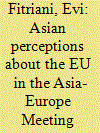

|
|
|
|
|
| Publication |
2011.
|
| Summary/Abstract |
The inauguration of the Asia-Europe Meeting (ASEM) in Bangkok in March 1996 has created enthusiasm and hopes for closer inter-regional relations between Asia and Europe. This article observes how behaviors of European countries representatives in the ASEM process have significantly shaped the perceptions of Asian officials and people about the EU and European intentions to develop mutually beneficial relations with Asia. It employs a constructivist framework in which the ASEM process is treated as a dynamic social setting for not only Asia-Europe inter-regional interactions but also intra-Asia socialization. Methodologically, it is a qualitative research with an inductive process and interpretive method. The research uses qualitative data, gathered from various sources and 82 in-depth interviews with diplomats, scholars, journalists, business peoples and civil society representatives in five Asian countries. This study finds that some behaviors of EU participants at ASEM or ASEF interregional forums are counterproductive for EU efforts to develop robust relations with Asian countries. The polarization between Asian and European groups in the ASEM or ASEF meetings, caused by political issues and colonial memory, contributed to the difficulties in trust-building between Asian and European participants. In addition, by their frequent absence from ASEM Summits, EU leaders squandered rare opportunities for a 'meeting of minds and hearts' with their Asian counterparts. This process seems to be a precondition for Asians to develop tangible cooperation.
|
|
|
|
|
|
|
|
|
|
|
|
|
|
|
|
| 3 |
ID:
145641
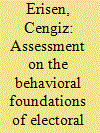

|
|
|
|
|
| Summary/Abstract |
Turkish politics has overcome several challenges in order to reach a situation with less political uncertainty. Among several issues, voter behavior in the two recent general elections in 2015 is a major topic of interest. In this think-piece, I discuss the behavioral indicators of vote choice and political judgments between the two 2015 elections. To that end, I first explore the context of public polarization before introducing the behavioral approaches to explain voter behavior. I use nationally representative survey data in order to make descriptive inferences that shed light on the unexpected change in electoral behavior.
|
|
|
|
|
|
|
|
|
|
|
|
|
|
|
|
| 4 |
ID:
190415
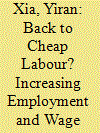

|
|
|
|
|
| Summary/Abstract |
After nearly two decades of rising wages for those in the unskilled sectors of China's economy, in the mid-2010s employment and wages in China began to experience new polarizing trends. Using data from the National Bureau of Statistics of China, this paper examines trends in multiple sectors and subeconomies of China, revealing the substantial rise of employment in informal, low-skilled services as well as the steady decline of wage growth in the informal subeconomy. At the same time, we find that although employment growth in the formal subeconomy is relatively moderate, wage growth in high-skilled services is steadily rising. These two trends pose a challenge for China, presenting a new and uncertain period of economic change.
|
|
|
|
|
|
|
|
|
|
|
|
|
|
|
|
| 5 |
ID:
173211


|
|
|
|
|
| Summary/Abstract |
A bargaining framework and a measure of conflict polarization are developed from two elements: (i) hatred-based negative externalities experienced by the parties to the conflict, and (ii) penalties the parties impose on their delegated negotiators when concessions are made in the bargaining process. The framework establishes agreement and disagreement regions and it is shown that a necessary condition for a negotiated solution is the adoption of a dual policy that combines dissociative political and military strategies. This analytical approach is applied first to polarized conflicts generally and then to the specific case of the internal conflict in Colombia between that country’s government and the FARC guerrilla group. The model provides a rationale for the complex dynamic of Colombia’s current peace process, which has involved a preliminary agreement and its subsequent rejection in a national referendum. Our analysis highlights the successful dissociative political-military strategy followed by the negotiators that enabled them to reach the agreement and the negotiators’ underestimation of the hatred levels that led the majority of the Colombian society represented in the referendum to vote the agreement down because they considered the concessions made by the government too generous to be acceptable.
|
|
|
|
|
|
|
|
|
|
|
|
|
|
|
|
| 6 |
ID:
190861


|
|
|
|
|
| Summary/Abstract |
Ex-combatants, war victims, and violence-affected community members are typically forced to live together as neighbors in post-conflict settings. Cases all over the world accumulate evidence on the fact that living together after war is a far from a harmonic endeavor, and individuals usually rely on contention mechanisms to keep on with their daily lives while in proximity of former and present-day antagonists. While decades-long academic research has unveiled a series of favorable conditions under which interactions might generate positive effects on intergroup dispositions, they usually prescribe focusing less on touching upon divisive issues, and more on emphasizing in potentially bonding commonalities. By means of a randomized controlled experiment with former war antagonists in Colombia, we set to explore whether avoidance or addressing of the most sensitive issues affecting intergroup relations yield better results in terms of attitude change under favorable conditions. Experimental effects show that perspective-giving protocols are capable of containing polarization tendencies in intergroup discussions even when participants are incentivized to directly address their co-existence problems, while qualitative analysis points out at silences and other avoidance mechanisms as the participants’ key strategies to contain conflict when contentious topics flare up during discussions.
|
|
|
|
|
|
|
|
|
|
|
|
|
|
|
|
| 7 |
ID:
187449
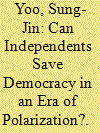

|
|
|
|
|
| Summary/Abstract |
It is evident from the literature that political polarization has played a role in facilitating voter participation. While high participation in a representative democracy is beneficial, it becomes dangerous when this results from intense polarization. This is because polarization has a greater potential to undermine the principles of democratic pluralism. With data from the 21st Korean general assembly, I find that independent voters consider political issues to be important cues for participation even under extreme polarization. Short-term issues such as the government response to COVID-19 that have largely been the concern of independent voters, have had a significant effect on voter participation, and the evaluation of party nominations has also had an impact on turnout among independents. These findings show that Korean democracy has not been completely buried under the influence of polarization and that the political process of representative democracy in Korea is still operating normally thanks to the existence of independent voters.
|
|
|
|
|
|
|
|
|
|
|
|
|
|
|
|
| 8 |
ID:
189015


|
|
|
|
|
| Summary/Abstract |
Domestic politics around the globe have become increasingly polarized along secular-religious lines. Recent literature suggests that one way to ease secular-religious tension and gridlock is for religious leaders to offer progressive reinterpretations of religious texts, that might convince religious conservatives to compromise from their seemingly-fixed policy positions. But can everyday citizens deploy religious reinterpretations themselves? We examine this question through a series of citizen debates in Tunisia, in which 602 participants attempted to reach a compromise over two ‘culture wars’ issues. Across both experiments, we find that having secular liberals engage religious conservatives with religious reinterpretations backfired, nearly halving the rate of compromise. Religious reinterpretations produced both defensive conservatives and emboldened liberals, obstructing compromise between them. While scholarship suggests that religious leaders may be able to deploy reinterpretations effectively, our results caution that everyday citizens may not.
|
|
|
|
|
|
|
|
|
|
|
|
|
|
|
|
| 9 |
ID:
080985


|
|
|
|
|
| Publication |
2008.
|
| Summary/Abstract |
Societies are sometimes divided into groups that behave in different ways or have strongly opposing opinions. At other times, everyone seems to behave according to similar principles and opinions. It is likely that individual decisions on behavior or opinions are affected by social networks through influence and selection processes. However, the outcomes are not necessarily optimal for the society as a whole. Two types of problems might arise: (a) polarization of the society into two camps that do not reach consensus, possibly leading to conflict; (b) actors choosing suboptimal behavior, because changing behavior is too risky if done unilaterally. Simulations show that if a society is rather segregated initially, there exists a heightened probability that this situation will worsen. The effect of network density is twofold. First, density has a positive effect on reaching a uniform opinion and, therefore, decreases the likelihood of polarization. Second, density increases the likelihood that actors do not change their behavior, worsening the inefficiency of already suboptimal initial situations
|
|
|
|
|
|
|
|
|
|
|
|
|
|
|
|
| 10 |
ID:
099224
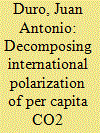

|
|
|
|
|
| Publication |
2010.
|
| Summary/Abstract |
The aim of this paper is to analyze the international polarization of per capita CO2 emissions with exogenous groups based on the Z-K measure (Zhang and Kanbur, 2001), whose main differential advantage lies on its factor-decomposability. In particular, we propose to use the factor decomposition based on Kaya (1989) by applying the methodology suggested by Duro and Padilla (2006). The main empirical results derived can be summarized as follows. First, the international polarization of emissions has significantly decreased over time during the period 1971-2006, when regional sets of nations based on the IEA structure are used; secondly, this decrease can be almost exclusively based on the reduction of the average dissimilarities among sets of countries and not due to a within-group cohesion process. Lastly, this reduction can be mainly attributed to the role of the affluence factor, and to a lesser extent, to the energy intensities. Thus, and given the values achieved for the different components, it seems that further reductions in the international polarization will continue be based on the economic convergence among groups.
|
|
|
|
|
|
|
|
|
|
|
|
|
|
|
|
| 11 |
ID:
127020


|
|
|
|
|
| Publication |
2013.
|
| Summary/Abstract |
History education can either exacerbate polarization and division or it can have conciliatory potential. Looking at a number of divided societies, we identify trends in curriculum portrayals of inter-group conflict. Noting the power of re-telling the past, we argue for a conciliatory approach to textbook design that entails the inclusion of multiple narratives. We detail why groups need to set out their own account of events and discuss the importance of the way that groups develop their accounts. We recommend an institutional, process-based approach to textbook design grounded in the values of deliberative consociationalism and argue that the conciliatory approach is best pursued in a two-stage model of deliberations. We develop this model and focus on how deliberations might occur and with what restrictions, taking seriously concerns about the applicability of deliberation in divided societies.
|
|
|
|
|
|
|
|
|
|
|
|
|
|
|
|
| 12 |
ID:
172532


|
|
|
|
|
| Summary/Abstract |
Is support for democracy in the United States robust enough to deter undemocratic behavior by elected politicians? We develop a model of the public as a democratic check and evaluate it using two empirical strategies: an original, nationally representative candidate-choice experiment in which some politicians take positions that violate key democratic principles, and a natural experiment that occurred during Montana’s 2017 special election for the U.S. House. Our research design allows us to infer Americans’ willingness to trade-off democratic principles for other valid but potentially conflicting considerations such as political ideology, partisan loyalty, and policy preferences. We find the U.S. public’s viability as a democratic check to be strikingly limited: only a small fraction of Americans prioritize democratic principles in their electoral choices, and their tendency to do so is decreasing in several measures of polarization, including the strength of partisanship, policy extremism, and candidate platform divergence. Our findings echo classic arguments about the importance of political moderation and cross-cutting cleavages for democratic stability and highlight the dangers that polarization represents for democracy.
|
|
|
|
|
|
|
|
|
|
|
|
|
|
|
|
| 13 |
ID:
186796
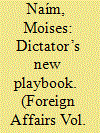

|
|
|
| 14 |
ID:
181665
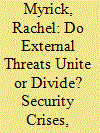

|
|
|
|
|
| Summary/Abstract |
A common explanation for the increasing polarization in contemporary American foreign policy is the absence of external threat. I identify two mechanisms through which threats could reduce polarization: by revealing information about an adversary that elicits a bipartisan response from policymakers (information mechanism) and by heightening the salience of national relative to partisan identity (identity mechanism). To evaluate the information mechanism, study 1 uses computational text analysis of congressional speeches to explore whether security threats reduce partisanship in attitudes toward foreign adversaries. To evaluate the identity mechanism, study 2 uses public opinion polls to assess whether threats reduce affective polarization among the public. Study 3 tests both mechanisms in a survey experiment that heightens a security threat from China. I find that the external threat hypothesis has limited ability to explain either polarization in US foreign policy or affective polarization among the American public. Instead, responses to external threats reflect the domestic political environment in which they are introduced. The findings cast doubt on predictions that new foreign threats will inherently create partisan unity.
|
|
|
|
|
|
|
|
|
|
|
|
|
|
|
|
| 15 |
ID:
086001
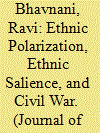

|
|
|
|
|
| Publication |
2009.
|
| Summary/Abstract |
This article examines how the relationship between ethnic polarization and civil war could be moderated by different degrees of ethnic salience. Using an agent-based computational model, we analyze the polarization-conflict relationship when ethnic salience is ``fixed''-high for every member of two nominally rival ethnic groups- and ``variable''-permitted to vary across individuals as a function of relative income. We find that (1) when salience is fixed, conflict onset is twice as high at low levels of polarization compared to when salience is permitted to vary, with the difference decreasing at high levels of polarization; (2) the relationship between conflict onset and the range over which we calculate variable salience is positive and robust for low and moderate levels of polarization; (3) the relationship between polarization and conflict onset is robust even under minority domination, if one holds salience fixed; and (4) holding ethnic salience fixed effectively amplifies the negative effect of polarization on economic performance.
|
|
|
|
|
|
|
|
|
|
|
|
|
|
|
|
| 16 |
ID:
187914
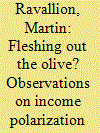

|
|
|
|
|
| Summary/Abstract |
In a rare example of a national goal for income distribution besides reducing poverty (for which there is a broad consensus), China's leadership committed in 2021 to attaining a less polarized “olive-shaped” distribution. The paper argues that the Foster-Wolfson polarization curve and index are well suited to quantifying this goal. New estimates indicate that polarization has been on a rising trend since 1981, but with a de-polarizing reversal emerging around 2009. There is no robust time-series evidence of polarizing effects of economic growth, poverty reduction or population urbanization. Larger urban-rural gaps in mean incomes have been strongly polarizing.
|
|
|
|
|
|
|
|
|
|
|
|
|
|
|
|
| 17 |
ID:
127637
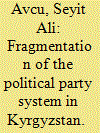

|
|
|
|
|
| Publication |
2013.
|
| Summary/Abstract |
A political party system is the nature and relations of the political parties in a given political system. There are four main variables in the classification of party systems: the extent to which parties penetrate society, the ideologies of the parties, the stance of the parties toward the legitimacy of the regime, and the number of parties in the system. The number of parties determines the level of fragmentation of the party system. Kyrgyzstan emerged as an independent country after the collapse of the Soviet Union. After two revolutions, which resulted in the ousting of the presidents, Kyrgyzstan officially changed its political system by announcing the introduction of parliamentary democracy and held its first elections after the regime change in October 2010. Five parties were able to pass the 5% national threshold to gain seats in the parliament. However, no single party gained enough of a majority to form the government on its own. Therefore, they formed coalitions, the latest of which includes three parties-the SDPK, Ar-Namys, and Ata-Meken-while the other two remained in the opposition: Respublika and Ata-Jurt. I estimated the effective number of parties by votes and seats and the least squares index for the 2010 parliamentary elections using Michael Gallagher's index, which utilizes the Laakso-Taagepera formula. The effective number of parties' index in Kyrgyzstan in terms of seat distribution in the Jogorku Kenesh was 4.90 for the 2010 parliamentary elections. However, the effective number of parties' index in terms of votes received by the parties is much higher: 9.86. On the other hand, the least squares index, which measures the disproportionality of the election results, is 13.75, which indicates the existence of many small parties with no seats. The 5% national threshold played a role in this disproportionality. The thesis of this article is that Kyrgyzstan's political party system is highly fragmented, and both institutional factors, such as constitutional and political party laws and the electoral system, and structural factors, such as social and political cleavages, play a role in this fragmentation.
|
|
|
|
|
|
|
|
|
|
|
|
|
|
|
|
| 18 |
ID:
117735
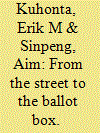

|
|
|
|
|
| Publication |
2012.
|
| Summary/Abstract |
The July 2011 parliamentary elections in Thailand were significant because they ushered politics away from street demonstrations and into the polling booth. Just about a year after the worst political violence in Bangkok since the 1992 Black May incident, these elections confirmed the dominance of Thaksin Shinawatra-aligned parties and the prominence of social movements in engaging the electoral process. Notable were the Red Shirts who moved from street battle to electoral contestation in supporting Phua Thai and the Yellow Shirts who campaigned against politicians and political parties. No election in Thai history has had such a high degree of social mobilization as that of the 2011 polls.
|
|
|
|
|
|
|
|
|
|
|
|
|
|
|
|
| 19 |
ID:
181163
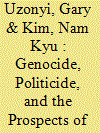

|
|
|
|
|
| Summary/Abstract |
Why do some autocracies democratize? A country’s violent past has received little attention. We argue that genocide and politicide undermine democratization by binding the elites’ supporters more tightly to the governing power, while cementing in-group/out-group animosities, and helping preserve the elites’ status quo position within the state. We test this argument on a new dataset of government atrocity and democratization since 1900. These novel data allow us to capture many important instances of atrocity missed by others, and thus take a longer look at democratization and violence throughout history. We find that episodes of genocide and politicide are associated with a lower likelihood of democratization in both the short and long run. These effects are larger and more consistent than other common explanations for democratization. They also differ from the effects of non-genocidal civil war violence.
|
|
|
|
|
|
|
|
|
|
|
|
|
|
|
|
| 20 |
ID:
117543


|
|
|
|
|
| Publication |
2012.
|
| Summary/Abstract |
Redistricting received substantial attention in the popular media in 2011, as states redrew state legislative and congressional district boundaries. Many reformers continue to argue for a de-politicization of the redistricting process, claiming that partisan redistricting is responsible for declining electoral competition and increasing legislative polarization. Our analysis of evidence from state legislatures during the last decade suggests that the effects of partisan redistricting on competition and polarization are small, considerably more nuanced than reformers would suggest, and overwhelmed by other aspects of the political environment.
|
|
|
|
|
|
|
|
|
|
|
|
|
|
|
|
|
|
|
|
|